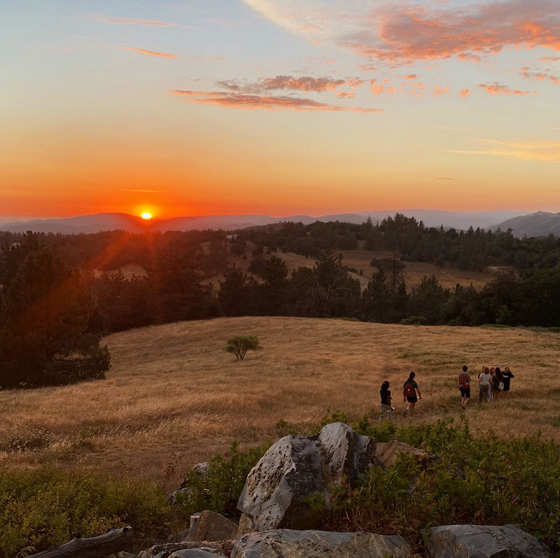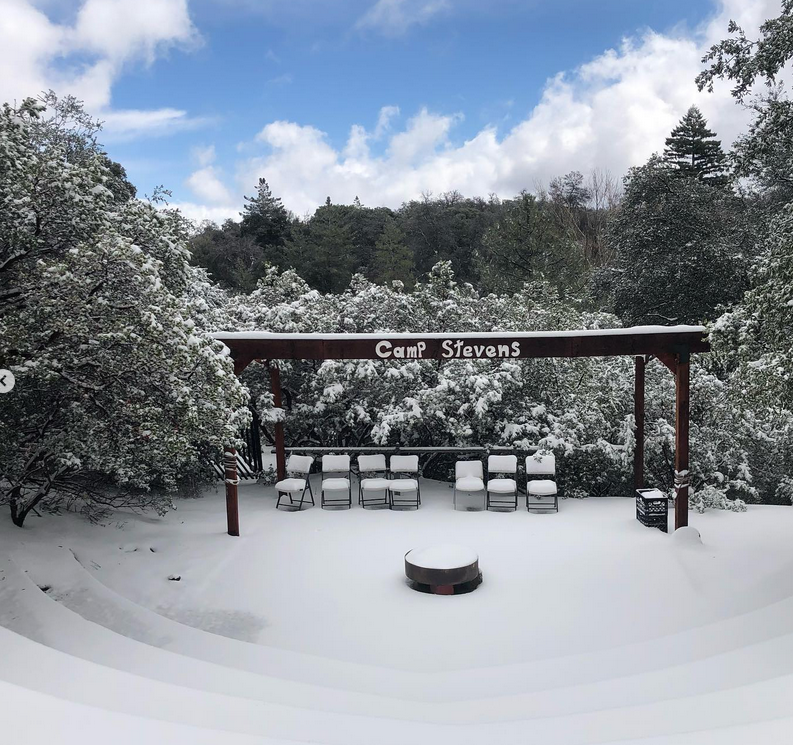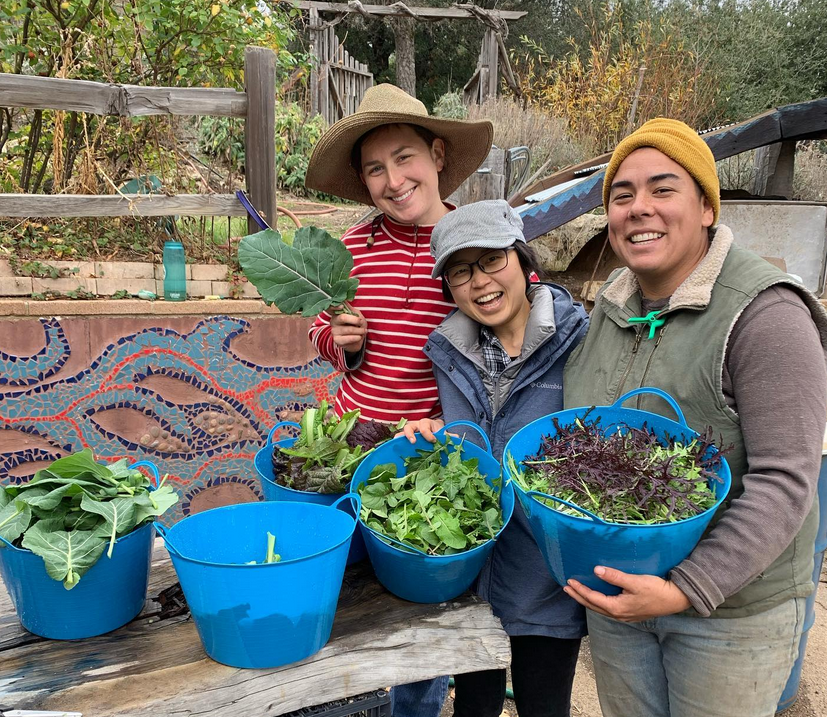“ I believe that the entrepreneurs that are going to succeed, that social enterprises that will succeed, understand that they’re intrinsically connected to their community, right? And so promoting social enterprise means that we’re promoting people, we’re promoting humanity, we’re saying “we are connected”.”
What makes Camp Stevens special?
Well, I think what's really special about camp Stevens is that it's a place that has a history of being forward thinking, and has a history of challenging what the norm looks like. And I think that that comes out in many different ways. So one of the ways that I would give an example is our summer camp program, -from a very long time ago, from the early 70s- it was teaching counselors how to do relationship building, how to work with people's child development, how to do a lot of things that have become really important in good and youth development work, we were at the forefront of that.
I think the other piece that sort of responds to that idea is that the ethos of our leadership here and how we've been is about being flexible and change. And so therefore, we've been able to survive a few you know, pretty hard things like a major fire on sites, of course, the pandemic time, any variety of changes that you can imagine, that's just like part of who we are, we embrace change. And that really trickles down to everybody. And I think the sort of the last piece that's more practical is that we have a space here that, when people come to visit, they feel renewed. And I think a reason for that is that they're able to really connect with the natural environment, which is just something that I think that strengthens the human spirit. But it's also a place where people are welcomed, whoever they are, whatever their walk of life is, it's here we are, I think we are at least attempting to do our best to make a space where people can just come as they are, and, and feel like they're welcome in that way. And that goes for all ages, top to bottom. So our youngest campers, all the way to our older grandparents that come for family camps, to individuals that come and retreat on their own. This is just a place where people can kind of let down their armor, and, and be a part of something special.
What are the biggest challenges that Camp Stevens currently faces?
So our business is, you know, in person overnight retreating. And so we've really been impacted by the pandemic. That was, we had to really shift gears and change a lot of ways that we were operating our business and how the sort of what we were providing as a service to the community had to really shift. And so financially, we were really impacted. And that was, you know, not shortly after, but within a 12 year period of having a major fire on site. So we're still kind of recovering, we just rebuilt our last building from the fire in 2018. And so it was a quick turnaround for us. So we're, I think, balancing all the things that a small business is concerned about, which is, you know, managing our cash flow, making sure that we have the funds to just run our operation, we've got 256 acres. So we're, we have a lot of space. And I think that's just something that every small business is dealing with post pandemic, in their own way. And then I think the other piece of it is that we are in a location that has a lot of concern about fire. So making sure that we're doing everything we can to prevent fires from coming and happening as much as we can. But of course, we don't have complete control over that.
And then I think on the more philosophical side, we're really trying to figure out where you know, where we belong in the larger community, the global healing process. We know that we have a lot to offer here because of who we are as the ethos that I described earlier.
But we're trying to kind of figure out where we belong in that bigger picture. I believe that as a mission of the ministry of the Episcopal Church, and as a camp, we're like the front porch of the Episcopal movement. So we're really accessible to people. And we can do a lot, we have a lot of opportunities. So I think that challenge of figuring out where we belong in the next steps is something that we're thinking about. And it's also exciting. It's a challenge. That 's exciting.
What is coming next for Camp Stevens?
So one big thing that's next for us is that, as I mentioned, we want to be part of the global healing process. We want to be part of the solutions for the future. So we're really engaging with parts of our work that have always been about shared leadership and restoration and openness. So we're actually having a large event in October, a restorative justice weekend. And we're going to be featuring a keynote speaker, her name is Valerie Core, who has written a book about revolutionary love. And we're just really excited. That's new for us. We haven't done something like this, where it's sort of this, you know, really turning completely outward and saying, What can we learn, and I love that that's definitely where we're going in the future. And then we want to continue on with that work, we teach. In the camp setting we teach restorative justice, we've just never really called it that, we've always called it, you know, just conflict resolution or something like that. But we teach circles of resolution, and we help the kids work out problems. We're not, we don't punish, we don't, we're not punitive. So it really fits with who we are. And there's no reason adults shouldn't enjoy and feel that feeling of restoration. And we also know that there are systemic issues in our world that need to be solved and resolved, that will take generations, and we want to be a part of that. So this is step one, and we are really putting ourselves out there as a part of this movement.
What do you think are the main strengths and weaknesses of Camp Stevens?
I think that the strengths and the weaknesses are combined. This organization is just based on doing what's right, and I think sometimes that makes our business stability difficult. But we have always weathered that, we've always gotten through that. So I think we have a lot of evidence to show that our strength is that we will pick the path that is based on our values first, even if this might cost a little more money, or it might strain us a little bit. One example of this is that during the pandemic, we made the choice to not lay off anyone, we made the choice instead to cut everyone's like, if we were going to reduce hours, 100% of us would reduce our hours in our pay, so that everyone could remain employed and have health care. And that was a decision made by our leadership team and supported by our board. And it was expensive, it was probably more expensive than laying a bunch of people off. But that did not seem like the right thing to do. Especially when there was a major health crisis. So for me, that feels like a major strength, but it can feel a little unstable sometimes… but it always feels like the right thing to do. So it's an interesting thing, especially as we're talking about social enterprise, that this is something that especially social enterprises will always deal with, as they're making business decisions.
What does social enterprise mean to you?
Well, my understanding of social enterprise is sort of a way that businesses are addressing their connectivity to the world around them. So whether it be nonprofits or for profit businesses, it's really -in my understanding and experience with social enterprise that is from a for profit standpoint- about taking up an understanding of like “we're going to do good work in our community, we know that we're connected to our community, and run our business”. So those two things in combination.
What are some social enterprises that inspire you?
Yeah. So I've worked in the nonprofit field pretty much my whole career. And so where I really see this pop out is with board members that I've worked with, because they have for profit businesses, from my understanding of social enterprise. But so they have for profit businesses that are generous and give time and energy to nonprofit organizations or to, you know, communities that have resource needs to be met.
So I think one really cool social enterprise that I don't even know if he would consider himself a social enterprise because he's so giving is a business in San Diego called Corine Heating and Air, and so it's a HVAC business. But he gives so much time and energy to local nonprofits. He also trains people to become HVAC technicians for free; you know, he'll bring them in and he'll do apprenticeships and pay them. And he really understands that people need work, and they need to explain your professional skills. And besides the financial investment in the community, I think he also asked his employees to volunteer in the community. As part they get paid there, they get paid while they're volunteering. So that's a very small family business that's doing incredible work to support their community.
Why do you think it is important to promote social enterprises?
Well, I think it's a change of attitudes. So it's a mindset change, that we're not just focused on a system that is about making more and more money. That's not working. That doesn't, that's failing our world. We can't monetize so many things. But businesses are really exciting. Enterprise and entrepreneurship are super exciting. I believe that the entrepreneurs that are going to succeed, that social enterprises that will succeed, understand that they're intrinsically connected to their community, right? And so promoting social enterprise means that we're promoting people, we’re promoting humanity, we're saying “we are connected”. And when I run my business, I get that I impact other people. And that’s at the forefront, rather than sort of 10 pages back: now businesses, for profit businesses, have mission statements, you know? Yeah, sure, they might have like a statement of what they kind of do. But for profit businesses who are social enterprises have missions, which is so cool. I think that's like, that's a big step for our world, that's not required through capitalism, right? So I think capitalism works best when social enterprise is the lead model for business.
How does embracing social enterprise change the way you think about your mission, work, etc?
“ the triple bottom line means that your organization is the best place to work, and that it’s the best place to receive services, and it is the best place to invest your money. So those three things are equal. So you can’t have a great business, you can’t have a successful enterprise, if you don’t treat your employees well. ”
So I have a very strong belief in the concept of the triple bottom line. I don't know if you're familiar with that at all. So it's a great sort of evolved business concept. So typically, you think of the bottom line as the financial bottom line. And it sort of trails back to the things I was talking about decision wise. But the triple bottom line means that your organization is the best place to work, and that it's the best place to receive services, and it is the best place to invest your money. So those three things are equal. So you can't have a great business, you can't have a successful enterprise, if you don't treat your employees well. And I think a great example of the triple bottom line concept is Costco. Costco has been one of the most successful businesses of all time, in the free market. They're a for profit company, but they make a work environment that is so supportive. They pay their people well, they give them benefits. They make work hours friendly for families. And they also provide, you know, excellent customer service, and they are a place where people really plan to invest their money, but I think that has a lot to do with that whole cycle, right?
I am personally a fan of starting with people first, and I think when you talk about the mission, that really comes to that: if you really invest in the people you have, you know, and if you hire great people, then the other things really fall into place. And even though it is hard and, like I’ve said before, it might feel like “Oh gosh, am I really gonna prioritize this?” it always makes the long term different. It might be hard for the short term but in the long term it's always better to make sure that you’re taking really good care of your people, and if you do that, they provide excellent customer service, and I like to think my stuff provide great service for people who come here cause they’re service leaders. I like to think that our donors really believe we are a great place in which they invest and their money is gonna be used well. You can be focused on if you are not always focused on cash, you gotta be focused on what your impact looks like and the rest will come.
What percentage of your budget is generated from your income and which one from grants or other sources?
Before the pandemic, we were about 70%, business income, 30% fundraising (grants or donors or any campaign of that nature). And then during the pandemic, we have been closer to 50/50. We did reduce our expenses quite a bit, so that the amount of both of those categories went way down. But that was necessary, because we couldn't, as I mentioned, have our regular business here with the nature of our work, right? So our balance changed. So we’re working right now. And I think it’s a healthy balance actually, for Camp Stephens to maintain its mission work, to provide access to people who wouldn't have maybe been able to access camp; I want to keep us at about a 60/40. So 60% business income feels very stabilizing with a 40% fundraising percentage.
What difference do Camp Stevens’ services you charge for make in the offer you have? How do your income programs (the ones you charge for) relate to your mission?
What Camp Stevens provides, as I mentioned before, is not just a restorative and healing space but a community. So I think that we provide that to every single person that comes here in their own way. Every individual is gonna experience us in their own way (...) So income programs are really important, because they really help balance out the missional work, right? So it's missional still, because you're still providing everything within the mission lens to the people who are participating, no matter what your services are. So for in our case, offering retreats, offering day hiking… offering things like that, people coming, using our space, they're paying a price. Part of that income, off the top of the margin can go straight into our summer camp scholarships, or for another family who needed some support financially to come on that same weekend, right. So it really ties back into this social enterprise idea that we are all connected. So if I'm a person who can pay the full amount -and you'll notice, at summer camp we have three tiered pricing- you can pick price A, which is the most expensive price. And it's still a little subsidized, but it's how much it costs to send a kid to camp for a week, you can pick that price, or you can pick price B, which is less expensive, and you know, it's subsidized, but maybe you can afford that. Or you can pick price C, which is much less expensive. Or you can apply for a campership. So we want -and the idea of our mission- is that people feel included and that they have access to our programs. That's the missional piece. And in order to do that, we need the whole community, we need the people who are going to pay the full price, we need the people who maybe wouldn't even consider going into camp otherwise, but now they can -because of the financial support-. And those people altogether here at Camp Stevens, they fill up each other's lives, they make each other think about other people's experiences. And that doesn't happen unless you consider all of those avenues. So income programs, in my opinion, in any nonprofit are very important. And I've always pushed for membership fees and things like that at any place I've been, because I think there are people that can pay those that will supplement the other pieces. And of course, you are always promoting access, always promoting inclusivity, always taking away barriers so people can participate, and you can only do that if you look at the balance of finance.


